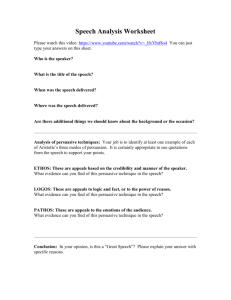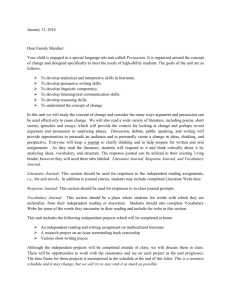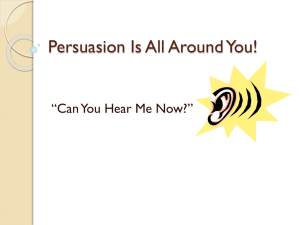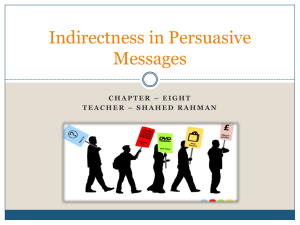Persuasion
advertisement
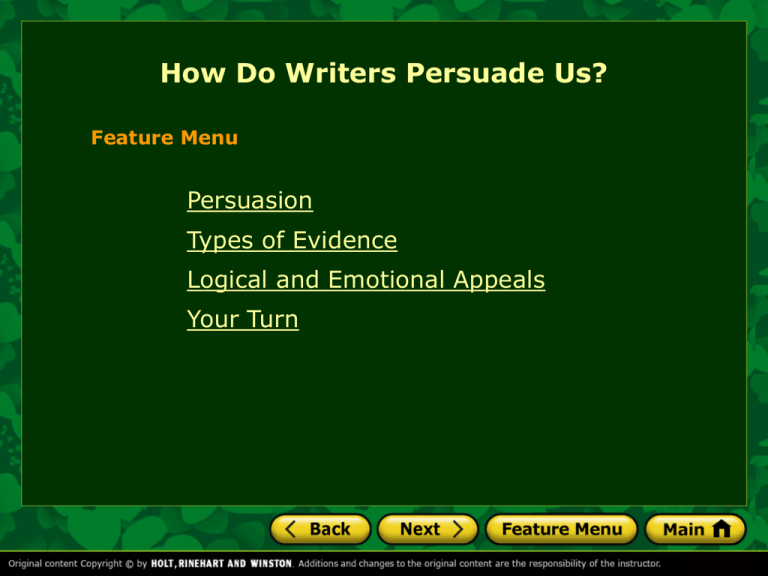
How Do Writers Persuade Us? Feature Menu Persuasion Types of Evidence Logical and Emotional Appeals Your Turn Persuasion Persuasion is everywhere. Skillful persuaders want you to see things their way: • Believe this! • Change that! • Trust me! Persuasion is the use of language or images to get us to believe or do something. Persuasion For writers, persuasion starts with an opinion—a belief or attitude. Opinion People should donate food and supplies to the Hebron Humane Society now. The writer then tries to convince, or persuade, you to accept this opinion. Persuasion To build an argument, a persuasive writer will use logic, or correct reasoning. When you use logic, you put information together to make a reasonable conclusion. If A is true . . . . . . then B must be true. Persuasion For logic to work, each point should follow from the other in a clear, sensible way. If A is true . . . The government has cut funding for the Humane Society animal shelter. . . . then B must be true. Therefore, the shelter staff need more help from the community. Persuasion For a persuasive argument to be logical, it must be supported by reasons and evidence. Reasons tell why writers hold particular opinions. (People should donate because) the Humane Society benefits the entire community. Evidence is support or proof that backs up the reasons. Sheltering homeless animals keeps them off the street. Persuasion Evidence is the foundation of persuasive writing. Writer’s Opinion Reason 1 Reason 2 Reason 3 Evidence for Reason 1 Evidence for Reason 2 Evidence for Reason 3 Persuasion The evidence and reasons support the opinion. People should donate food and supplies to the Hebron Humane Society now. Supplies are low. Shelter benefits the community. Humane Society is low on funds. Some of the cats do not have beds or toys. People can adopt a dog or cat for a very small fee. Budget was cut by $50,000 last year. Persuasion Quick Check The school board should include money for new buses in next year’s budget. We need new school buses as soon as possible. The old ones are not reliable. Last spring, three different buses broke down, leaving students stranded on their way to school. These students waited an average of two hours for another bus to pick them up. What reason does the writer give for his opinion? What evidence does the writer give to support this reason? [End of Section] Types of Evidence To get you to believe or do something, writers have to present convincing evidence. Facts Quotations Statistics Examples Anecdotes Types of Evidence Facts • statements that can be proved true • can be confirmed in reliable sources (books, newspapers, and so on) Every pet at the Humane Society shelter is spayed or neutered before being adopted out. Types of Evidence Quotations • comments people have made about a topic A direct quotation is a person’s exact words: “The staff helped us pick out just the right cat for us,” said Mrs. Lucy Fernandez of South Hebron. Types of Evidence Quotations • comments people have made about a topic An expert opinion is a statement by someone who is an expert on the subject: Regional director Gary Stokes commented, “All animal welfare groups rely on help from their communities.” Types of Evidence Statistics • information presented as numbers • may be given in the text or in a chart Text Chart In the past three years, the cost of operating the shelter has increased by $30,000. Cost to Operate Shelter 2007 2008 2009 $200,000 $220,000 $230,000 Types of Evidence Examples • specific illustrations of a general idea For instance, a number of cats went without their regular shots because there was no money left in the budget. Types of Evidence Examples A case study is a special type of example based on scientific research. In a long-term study, Lynette Winters, D.V.M., showed that pets adopted from shelters where conditions were good made better, healthier pets than those adopted from less desirable shelters. Types of Evidence Anecdotes • brief personal accounts that illustrate a point On several occasions, Jared Epps, an adoption counselor at the shelter, has had to leave his desk, drive to a nearby pet store, and buy food for the animals himself, using his own money. Types of Evidence Quick Check 1. “If there were a convenient, safe trail, I would ride my bike to work most days,” said Ms. Brenda Gibson of Ridgecrest. 2. The city has not added any new bike paths since 1998. 3. A recent survey showed that 1 in every 30 city residents currently uses a bicycle to get to and from work or school. For each item, identify the type of evidence. Choose from the list below. example quotation statistics anecdote fact [End of Section] Logical and Emotional Appeals When you read a persuasive article or essay, look for two different types of arguments: 1 Logical appeals • support the argument with facts and other sound evidence • target the reader’s thinking ability If every household in Hebron would donate one twenty-pound bag of food, the shelter could feed its animals for a full year on those donations alone. Logical and Emotional Appeals When you read a persuasive article or essay, look for two different types of arguments: 2 Emotional appeals • use evidence that affects feelings • often appeal to emotions such as fear, pity, and jealousy Think of the poor homeless pups and kitties. Do you really want them to suffer any more than they already have? Logical and Emotional Appeals Effective persuasive writing often uses a combination of logical and emotional appeals. Opinion: People should donate food and supplies to the Hebron Humane Society now. Logical Appeal Emotional Appeal The shelter cares for more than two thousand homeless pets every year and finds them loving homes. What will happen to these animals if the Humane Society runs out of food, supplies, and money? + Logical and Emotional Appeals Be careful when reading a persuasive article or essay. • Don’t be swayed by emotional appeals alone. • Make sure the writer’s position is also supported by solid evidence. Logical and Emotional Appeals Quick Check 1. Volunteering helps young people learn about work and think about careers they might like. 2. Many senior citizens would go hungry if it weren’t for the volunteers who bring them meals. 3. Students who volunteer in their communities grow up to be more successful than those who do not. Identify each statement as either a logical appeal or an emotional appeal. [End of Section] Analyze Persuasion Your Turn 1. Give an example of a statistic you’ve heard of or read. What conclusion might the statistic support? 2. Describe a television commercial you’ve seen that included an emotional appeal. To which emotion did it appeal? The End

